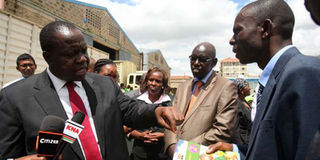Curriculum review team to present proposals

Education Cabinet Secretary Fred Matiang'i (left) talks to the Deputy Project Coordinator of Early Grade Maths, Ateng Ogwel, in Embakasi on April 14, 2016. The team chaired by Dr Matiang’i will put forth suggestions on the framework of the syllabus and its implementation plan. PHOTO | EVANS HABIL | NATION MEDIA GROUP
What you need to know:
The team chaired by Education Cabinet Secretary Fred Matiang’i will put forth suggestions on the framework of the syllabus and implementation plan.
Efforts pushing for a new education curriculum are gaining ground with experts expected to present proposals at a stakeholders meeting in Nairobi on Friday.
The team chaired by Education Cabinet Secretary Fred Matiang’i will put forth suggestions on the framework of the syllabus and its implementation plan.
It has recommended the shift from the current 8-4-4 system, which has been in place since 1985, to 2-6-3-3-3 format that will ensure learners acquire competences and skills to meet the human resource aspirations of Vision 2030 blue.
“The framework entails vision, mission and the principle of competencies expected at every level of learning and learning areas,” Dr Julius Jwan, Kenya Institute of Curriculum Development (KICD) director, said.
The first session was held in March this year when the KICD handed delegates a report on the assessment of the current education system.
He added that the proposals will prepare the ground for the revamped academic structure that will be launched at another meeting in August.
“At every stage we want to update key stakeholders what we have achieved so that we do not ambush Kenyans with a system at the end of the process,” he said.
The team comprises individuals from religious organisations, universities, secondary schools, civil society and teachers’ unions.
It is mandated to carry out several tasks such as providing guidance on policy requirements for the different levels of education relating to development, implementation and assessment of curriculum for education and training; coordinate the development of budgets and implementation framework for the reformed curriculum and; support the training of teachers who will be involved in monitoring and evaluation of the overhauled module.
In a needs assessment report that was presented to stakeholders last month, Kenyans suggested an education system that will put more emphasis on skills as opposed to theory and examinations.
In secondary schools, the government will be required to put up special needs schools to hone skills of talented students – which will be a new undertaking.
The 8-4-4 system has been widely criticised for being expansive, heavily loaded in terms of content and too examinations-oriented, which when combined, put undue pressure on the learners.





